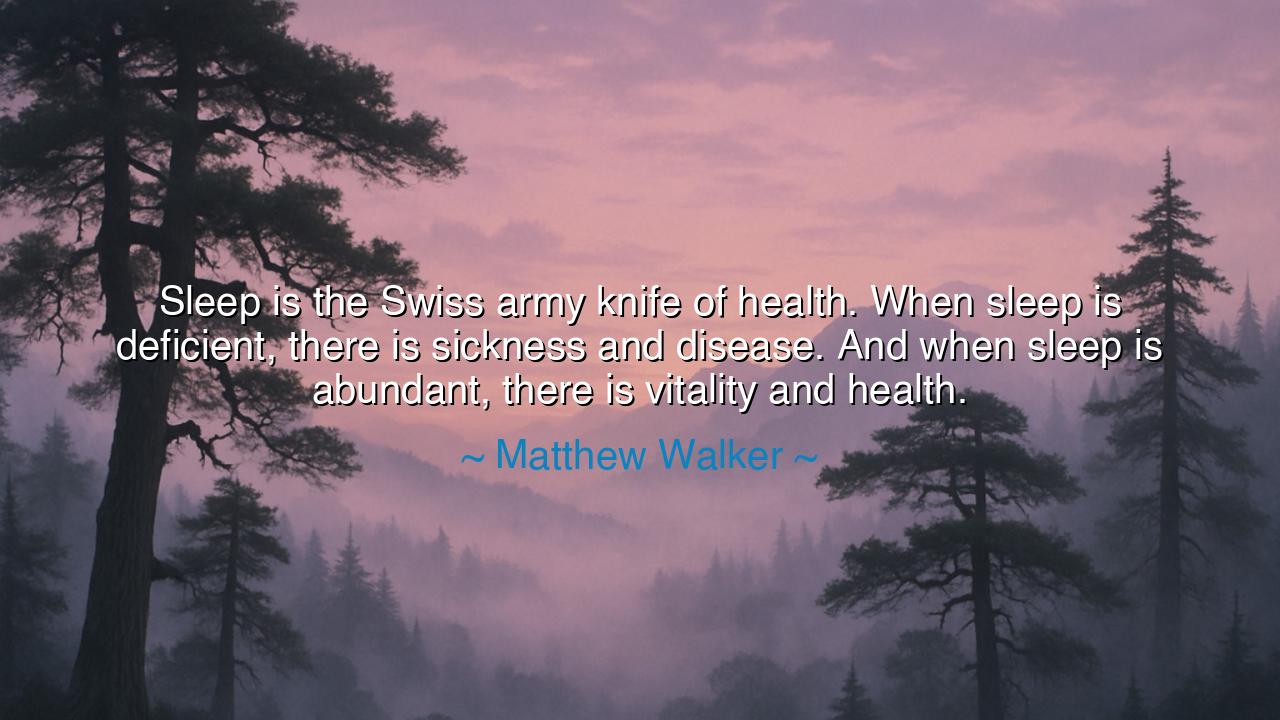
Sleep is the Swiss army knife of health. When sleep is deficient
Sleep is the Swiss army knife of health. When sleep is deficient, there is sickness and disease. And when sleep is abundant, there is vitality and health.






In the wise and luminous words of Matthew Walker, a scholar of the human body’s hidden rhythms, we find a truth both ancient and eternal: “Sleep is the Swiss army knife of health. When sleep is deficient, there is sickness and disease. And when sleep is abundant, there is vitality and health.” Though he speaks in the language of science, his message carries the tone of timeless wisdom — that sleep, humble and silent, is the unseen guardian of life itself. In the stillness of the night, the body heals, the mind restores, and the spirit is renewed. For without sleep, the very foundations of life begin to crumble.
In calling sleep the Swiss army knife of health, Walker reveals its wondrous versatility — its ability to heal, protect, and strengthen every part of our being. Just as the many blades of a Swiss knife serve countless purposes, so too does sleep serve the whole of life: it sharpens memory, strengthens the heart, balances emotion, and repairs the fragile tissues of flesh and thought alike. In the silence of the night’s embrace, the body mends and the soul breathes anew. But when this sacred rest is neglected, the price is grave — the mind grows clouded, the body weakens, and the heart loses its rhythm.
This truth is not new, though science now gives it voice. The ancients, too, revered the restorative power of sleep. The Greeks built temples to Asclepius, the god of healing, where the sick would lie down to dream. There, priests would interpret their dreams as messages of cure — for they believed that sleep was not merely rest, but communion with the divine. Even Aristotle, in his wisdom, declared that sleep is “the natural restoration of the body.” And indeed, what prayer or medicine could compare to the simple miracle of awakening whole after a night’s rest?
History offers us lessons carved in the lives of those who ignored this sacred law. Consider the tale of Napoleon Bonaparte, that relentless conqueror who boasted that he needed no more than four hours of sleep. In time, his mind grew restless and erratic, his judgment clouded, his empire undone by exhaustion and pride. The man who once commanded nations could not command his own body. Contrast him with Albert Einstein, who cherished his rest and often credited his insights to moments born from dreams. Thus, we see that genius and strength are not born of sleepless ambition, but of well-tended rest.
Walker’s words remind us that in the modern world — where light never fades and labor never ceases — humanity has grown deaf to the ancient call of the night. We praise the sleepless worker and scorn the one who rests, yet this is folly. For to rob oneself of sleep is to borrow life from the future, a debt that the body will one day demand in full. The immune system weakens, the heart falters, and the mind, deprived of its nightly cleansing, begins to drown in its own fatigue. Sleep is not idleness; it is restoration, the rhythm by which nature preserves her children.
Thus, when Walker speaks of sickness arising from sleep’s deficiency and vitality springing from its abundance, he is describing the eternal balance that governs all living things. The moon does not shine without the sun’s retreat; the body cannot thrive without the spirit’s repose. To sleep deeply is to trust the universe, to surrender the day and awaken reborn. It is both act and art — the daily renewal that keeps mortality at bay.
Let the lesson, then, be clear to all who seek wisdom and well-being: honor your sleep. Guard it as fiercely as you would your wealth or your health, for it is both. Lay down your burdens at the setting of the sun. Let go of the glowing screens and restless thoughts. Create silence, embrace darkness, and let your body and mind return to the order from which life itself was born. For those who rest well rise stronger, wiser, and gentler — the very embodiment of vitality and health.
So remember the teaching of Matthew Walker: that sleep is no luxury but the mother of all healing. To neglect it is to poison one’s days; to cherish it is to drink from the fountain of renewal. As night returns each day, so too does the opportunity to restore the sacred harmony of life. Sleep, then, not in guilt or haste, but in reverence — for in those quiet hours lies the strength of the heart, the clarity of the mind, and the health of the soul.






AAdministratorAdministrator
Welcome, honored guests. Please leave a comment, we will respond soon